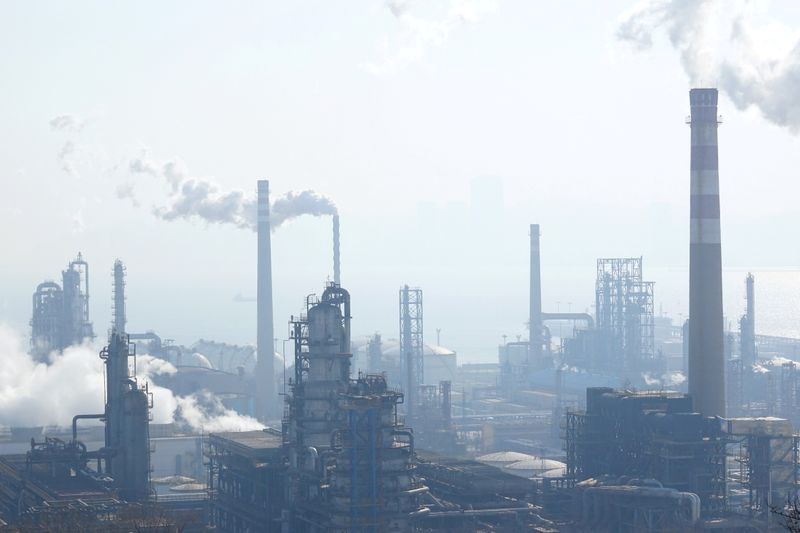By Chen Aizhu and Muyu Xu
SINGAPORE/BEIJING (Reuters) - China is set to further expand its massive oil refining capacity this year, offering support to global oil prices, and U.S. producers in particular, but its plans spell more gloom for Asia's hard-hit refining industry.
Already the world's No.2 oil refiner after the United States, China added 800,000 barrels per day (bpd) of capacity last year - 80% of the United Kingdom's refinery throughput - and analysts expect a further 460,000 bpd to become operational in 2020.
Domestic demand, however, has failed to keep pace. Chinese exports of diesel, gasoline and jet fuel combined jumped 20% in 2019, reaching as far as Mexico, Nigeria and Italy, and weighing on global refining margins.
Asian benchmark refining margins for diesel and jet fuel are already languishing at more than two-year lows, and any increase in Chinese shipments is expected to add further pressure. (Graphic: Singapore refining margins spiral lower amid China's expanding fuel production surplus, https://fingfx.thomsonreuters.com/gfx/ce/7/8278/8259/SingaporerefMarginsJan2020.png)
"The growth in product supplies will far outpace the expected demand growth of transportation fuels, adding pressure to already weak regional cracks," said Chen Jiyao, oil consultant with FGE.
Analysts expect aviation fuel and gasoline to lead China's export growth this year due to bulging supplies and slackening domestic consumption, with the coronavirus outbreak adding to concerns, pinching refining profits at regional exporters such as South Korea and Singapore.
China is already Asia's No.1 exporter of gasoline and jet fuel, and ranks No.3 in diesel after India and South Korea.
OIL SUPPORT
Still, with refinery throughput set to jump by 500,000 bpd to 620,000 bpd due to expansions and new refineries, according to analysts at FGE, SIA Energy and Wood Mackenzie, China's push will extend a bright spot for crude oil demand.
While the growth rate is down from last year's 921,000 bpd, it will still account for nearly half the increase in global oil demand forecast by the International Energy Agency this year.
China imports around 80% of its oil needs, and crude imports are estimated to rise by 400,000-480,000 bpd in 2020, according to FGE's Chen and Seng-Yick Tee, senior director of SIA Energy. This is down from 882,000 bpd last year, according to China customs data.
The oil will feed Sinopec Corp's greenfield 200,000-bpd plant in Zhanjiang, Sinochem's 60,000-bpd expansion facility in Quanzhou, and the 200,000-bpd crude unit of privately-led Zhejiang Petrochemical Corp which started operations in Zhoushan last December.
(Graphic: China's refining capacity & crude oil throughput, https://fingfx.thomsonreuters.com/gfx/ce/7/8233/8214/China's%20refining%20capacity%20vs%20throughput.png)
Increased purchases will be a boon for exporters like Saudi Arabia, Kuwait and the United States, which is looking to boost energy product sales to China as part of Phase 1 of the trade deal.
Last month's Phase 1 pact means China needs to boost buying of U.S. oil, which is mainly light and of low-sulphur, but as the new plants are geared towards processing medium high-sulphur grades, importers will have to find a balance between their refining needs and Beijing's imperatives.
"Political fiat rather than market mechanisms will dictate flows," said Michal Meidan, director of the China energy programme at the Oxford Institute of Energy Studies.
"Baseloads for the new refineries are mainly Middle Eastern grades so U.S. flows will likely push out West African or North Sea oil (of similar quality)," he said.
JET FUEL FLOWS
Analysts expect China's exports of diesel, gasoline and jet fuel combined to maintain double-digit growth in 2020.
Aviation fuel is set to lead exports with a 20% increase, due to faster expansion in domestic production versus declining demand growth, said Wang Yanting, Shandong-based analyst at consultancy JCL Network Technology.
Curbs on air travel amid fears of a new coronavirus epidemic will further dampen jet fuel consumption, which an executive with China National Aviation Fuel Company told Reuters grew at 6.2% last year, down from 7% in 2018.
"We were forecasting growth at 6% this year (before the virus outbreak). It could only be lower," said the executive.
Exports of diesel and gasoline, however, will be capped as refiners shift production to make cleaner marine fuels to meet new international emission standards that came into force this year.
Refiners will divert more vacuum gas oil, the main feedstock for the production of very low sulphur fuel oil, to marine fuel, reducing diesel or gasoline output depending on plant configuration, refinery officials said.
Gasoline exports are still seen growing strongly, however, after surging 27% last year.

(Graphic: China's refined oil products output vs exports, https://fingfx.thomsonreuters.com/gfx/ce/7/8234/8215/China's%20refined%20oil%20products%20output%20vs%20exports.png)